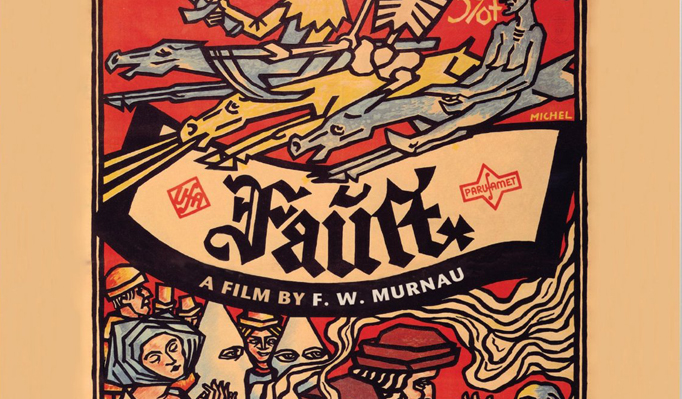
Faust Blu-ray Review
 In 1947 German film historian Siegfried Kracauer wrote of Faust as “not so much a cultural moment as a monumental display of artifices captilizing on the prestige of national culture.” Meanwhile Faust was seen abroad as a piece of work of artistic merit that led to the director, F.W. Murnau leaving Germany for good and arriving in Hollywood to makea film seen by many as the height of artistic prowess during the silent age – Sunrise (also released by Eureka!). In Germany the film was viewed rather less enthusiastically as a piece of style over content. Murnau only made a couple of films in the US before his life was tragically cut short in a car accident. Yet he is a complex director and it would be fair to say that the film has varied opinion on it. It begins impressively but does fall into kitsch and sentiment in the love story element that was seen as him trying to curry favour with Hollywood rather than making something darker, more Germanic. Faust is to be released by Eureka! in their Masters of Cinema series for the second time, but this time released as a dual format disc.
In 1947 German film historian Siegfried Kracauer wrote of Faust as “not so much a cultural moment as a monumental display of artifices captilizing on the prestige of national culture.” Meanwhile Faust was seen abroad as a piece of work of artistic merit that led to the director, F.W. Murnau leaving Germany for good and arriving in Hollywood to makea film seen by many as the height of artistic prowess during the silent age – Sunrise (also released by Eureka!). In Germany the film was viewed rather less enthusiastically as a piece of style over content. Murnau only made a couple of films in the US before his life was tragically cut short in a car accident. Yet he is a complex director and it would be fair to say that the film has varied opinion on it. It begins impressively but does fall into kitsch and sentiment in the love story element that was seen as him trying to curry favour with Hollywood rather than making something darker, more Germanic. Faust is to be released by Eureka! in their Masters of Cinema series for the second time, but this time released as a dual format disc.
The Faustian legend is a classic piece of Germanic storytelling set in a non-descript central European town (probably Germany) in which the Devil wagers with a white angel that he can corrupt the human soul whereupon he makes a bet. To prove his point the Devil spreads plague to the unnamed German town in a very impressive piece of visual with the classic horned and portly devil (played by Emil Jannings) looming as a giant over a (model) medieval town spreading plague in the form of a black soot. When old man Faust is seen to cure the dying people some see him as a saviour and then a demon league with the Devil before the appearance of the Devil himself in disguise as Mephistopheles. Mephistopheles takes Faust’s soul in the form of giving him anything he desires and of course Faust takes youth and transports him to the town of Heimat (which in German means homeland). Here there is a wonderful visual of the pair travelling by cloud over mountains and forests to the idyllic Heimat (Muranu was a pilot in the First World War). Here the director blends the telling of Faust with Christopher Marlowe’s original work and that of Goethe with the styling of Gounod’s opera of the same name.
Faust starts very impressively with some of the most stunning filmmaking committed to screen. It’s no surprise to any fan of silent cinema that Murnau is considered something of a genius. He was a notorious task master who had no problems in putting actors and crew through their paces to attain the perfect shot (fellow and contemporary director Fritz Lang was cut of similar cloth). Of course Murnau made some of the most amazing examples of silent German Expressionist cinema that included Nosferatu (1922) and the sadly lesser known but most impressive The Last Laugh (1924) – both of which are also released by Eureka!. In fact Eureka have released an impressive 10 films by Murnau in their Masters of Cinema range.
For this version the dual format disc shows two versions of the film – the more often seen international print and for the first time and most impressively the domestic (German) one. Given a choice, take the domestic one which has some sharper editing, better angled shots and curiously a real bear instead of a man in a bear suit for the scene in the market place near the beginning of the film. This was because cameras would be set up side by side for different versions of the film but it is good to see that the domestic one is now given a chance to be shown. The reconstruction done by the Friedrich Wilhelm Murnau Stiftung is outstanding and of course there are still scratches and signs of age but these have been greatly improved. Extras on the disc include an introduction by David Cairns and somewhat at times irritating commentary by Bill Krohn and David Ehrenstein who provide somewhat uncritical commentary but laced with lots of interesting facts. Of course there is also the typical Eureka! Masters of Cinema wonderful booklet, here at 48 pages with an essay on the film by Peter Spooner, one on the different versions of the film by R. Dixon-Smith as well as an extract from French film director Eric Rohmer’s thesis on the film.
Chris Hick
